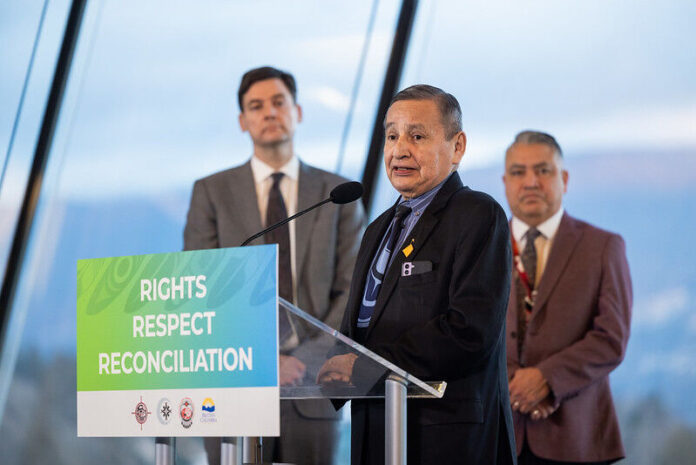Union of BC Indian Chiefs president Grand Chief Stewart Philip is walking back his previous opposition to the scrapped Northern Gateway Pipeline.
The proposed project would have sent Alberta bitumen to B.C.’s North Coast, near Kitimat, for export overseas but was written off by Prime Minister Justin Trudeau in 2016 after a moratorium on crude oil tanker traffic in BC.
While speaking at the First Nations Leadership Gathering in Vancouver, Philip stated he now supports shipping more oil through BC due to the escalating trade war between Canada and the United States.
“When I look back on that, it was a different time. We are staring into the abyss of uncertainty. Right now, with climate change and the climate crisis and the American threat – I would suggest if we don’t build that kind of infrastructure, Trump will.”
Philip noted now is the right time to re-start such a project, citing if we don’t, US President Donald Trump will and it would likely have little to no consideration for the environment.
“I think that we can do better, I think we know we can do better and we need to utilize the principles of the relationship between leadership council and government to work our way through these proposals.”
“As long as we respect the integrity of the land, the waters and, the rights of our people and the interest of other British Columbians in regards to lifting our economy, that is the challenge.”
While BC Premier David Eby didn’t go as far as saying yes to restarting Northern Gateway, he did state diversifying the province’s economy will be key going forward.
“From my perspective, I have some differences of opinion with Premier Smith (Danielle) but where we are aligned is that we need to stick together as a country to defend jobs and economic activity in this province.”
BC Assembly of First Nations Regional Chief Terry Teegee, who was the Tribal Chief of the Carrier Sekani during the peak of the project being developed, noted there is a plethora of opinions among Indigenous groups related to resource projects stating that having an approval process in place that takes those differences into account is key.
“If we don’t, the problem is that we end up in court. For better or for worse, many of these court cases First Nations would win. But, it’s not up to the judge to create that relationship between First Nations and the province or federal government – and it’s not the ability of a judge to create that relationship. It’s not in the judge’s ability to allow projects to move forward.”
“We were very concerned about the development of a diluted bitumen pipeline and certainly (within the Carrier Sekani), I am not aware that we have changed that position in terms of the tribal council and in my nation. Nevertheless, I think it was really an important lesson in terms of developments that transect and are linear that crosses many territories and First Nations territories whether it would be Alberta or British Columbia. Certainly, some First Nations agree with some of the projects while others don’t.”
In a statement, Enbridge told Vista Radio it has no plans to develop Northern Gateway and is focused on leveraging there pipeline already in the ground.
Something going on in the Prince George area you think people should know about?
Send us a news tip by emailing [email protected].






